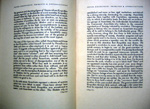|
the gracious and charming figure of Guyau whom Kropotkin always regarded as the founder of a new morality. Kropotkin himself takes his high place in this noble band not so much by power or brilliance in any one direction, as by a fine combination of qualities, for he was at once an aristocrat and a martyr, a philosophic thinker and a revolutionist, eminent not only by his high accomplishments in science but by his willingness to share the lot of the lowliest, and throught all conspicuous by the nobility of his personal character. Through this possession of a beautifully many-sided nature he became not indeed one of the greatest of the long line of such men but one of the most typical.
The men of this type are often called Anarchists and it was so that Kropotkin called himself. Invented by Proudhon in 1840 and since so often employed, it is yet not a happy name. It suggests a disorganised rebellion against all governemtn, and it is not surprising that to the vulgar mind "anarchist" often means "criminal", and still less surprising that the common criminal is often pleased to dub himself "anarchist". But the people called Anarchists, outside criminal circles, are not in favour of disorganisation nor of the rejection of government. What they seek to maintain is organisation from within rather than from without, and self-government rather than government by others. "Do what you will", was the inscription Rabelais set up over the Abbey of Thelema, but he proceeded at once to point out that people who are well born and well bred will to do that only which it is good to do.
In the wide sense Anarchists represent a stream of opinion which has never failed to exist. There have always been Statists, on the one hand, Kropotkin was accustomed to assert, and Anarchists on the other. The Statists rely on
established and more or less rigid institutions maintained by a strong minority dominating the majority; Anarchists reject the State together with Capitalism, oppression, and war, to which it inevitably leads. But there are, as we know, two groups of Anarchists, the Individualist Anarchists and the Communist Anarchists who believe in the concerted organisation of Society, initiated by revolution. The supreme figures in history who are claimed as Anarchists may probably all be said to belong to the Individualist group. Obviously, however, along that line there is little chance of a speedy remoulding of society, therefore sanguine and optimistic spirits tend to be drawn towards Communist Anarchism which promises a speedier cure for the world's ills. It was in this direction that Kropotkin was drawn. He expected a revolution to occur about the end of the nineteenth century, to begin in one of the great countries of Europe and to overspread the world. The society thus formed would, he said, be an organised interwoven network. He overlooked the fact that that is just what the mnuch-denounced State is, and that after kicking the State out of the front door he would be letting it in at the back door. For the mob remains the mob, whether or not i labels itself "State" and an oppressed majority has ever proved even more dangerous than even an oppression minority. Kropotkin's psychology was a little too simple. He asserted that some human beings are "venomous beasts" and must be destroyed by other human beings whom he regarded as pure-souled altruists. But he scarcely seems to have realised that the majority of human beings are neither the one nor the other, but have in them both a streak of the "venomous beast" and another of the pure-souled altruist. The great revolution that Kropotkin foresaw duly arrived, although a few years later than he expexted. It is a revolution of which the exact char-
|

|